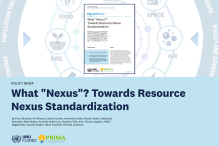With our MSc in Public Policy and Human Development (MPP) application deadlines approaching (1 May 2024 for non-EU applicants and 1 June 2024 for EU applicants), we thought we’d provide an overview of the application process and some helpful tips to support anyone who’s thinking about applying for the September 2024 intake.
ℹ️ The documents you’ll need to apply to our MSc programme:
- A digital passport picture
- A digital copy of your passport / identity card
- A recent copy of your CV
- Two recommendation letters, from current or former professors and/or employers
- Digital copies of your degree(s) and lists of grades (if necessary, translated into English by an official translation agency)
- A motivation letter (400-500 words) which explains why you chose this programme and which convinces the Board of Admissions that you will complete the programme successfully
- An essay (1000 words in Word/PDF with searchable text) – details below
- Depending on your academic/work background, you may need to submit proof of language proficiency in English, find out if you meet the language requirements under the 'Additional requirements' section on this webpage.

📝 The essay element of the application:
MPP Admission Essay for Academic Year 2024/25
The problem:
Globalisation, digitalisation, decarbonisation and demographic change are global challenges that are changing labour markets in most countries of the world. Individuals, firms and societies have to find ways to adapt to these challenges in order to maintain their livelihoods. Policymakers are called to come up with a policy response to ensure that societies can cope with the changes without negatively affecting people’s well-being and development.
Instructions to applicants:
Choose one of these global challenges affecting labour markets (globalisation, digitalisation, decarbonisation or demographic change) and:
- Provide a brief analysis of the problem (maximum 300 words), and
- Provide and argue a policy solution that governments should consider (maximum 700 words).
You are encouraged to use different sources, and you need to use at least one of the sources listed on this webpage.
The essay should display a sufficient level of English and an appropriate academic writing style, including the use of references.
💡 Tips on how to write a good admission essay:
✅ When writing your essay, make sure to read the instructions carefully and follow them.
✅ Proper referencing is important - if you are unsure about how to do this, this tutorial published by the Maastricht University Library will give you a more concrete idea of how to acknowledge sources and cite references.
✅ While the use of references is recommended, it is also important to use your own voice and present your own ideas when writing the essay.
✅ Provide practical examples and focus on a policy solution, maybe two, that you can justify adequately and elaborate on instead of superficially enumerating different options.
✅ Be critical, and discuss potential pitfalls of your policy recommendation and how they can be addressed.
🎯 General advice about the application process:
✅ When writing your motivation letter, it is not necessary to repeat all the information listed in your CV. Use the space instead (and try to keep the length to roughly 400-500 words) to explain why you are interested in the MPP programme and why you picked UNU-MERIT/Maastricht University for your master’s studies. Also, bear in mind that our Board of Admissions is looking for highly motivated individuals who are aiming to use public policy to solve real-life problems and are committed to the achievement of the Sustainable Development Goals, so be sure to demonstrate your personal interest in these topics. When doing this, be realistic – short- or medium-term goals that are concrete and plausible are more effective when conveying your motivation to pursue the MPP. Finally, you may also briefly write about the value you can bring to the whole MPP cohort, not just what the MPP will mean for you and your career.
✅ The MPP is an interdisciplinary master's programme. With the application process, we want to make sure that you are able to learn topics that you have not heard about before and build on other topics that you have already learned about in your prior studies. We look at your application in a holistic way to ensure that you are equipped with the knowledge, skills, and motivation to enjoy and take advantage of the MPP.
✅ Pay special attention to the essay, since with this requirement we assess your analytical capacity and your critical thinking.
✅ If you have obtained multiple degrees, e.g. a bachelor’s and a master’s, don't forget to upload the diploma and transcripts for both degrees.
✅ Request your referees to provide a ‘non-generic’ letter more than two or three sentences long, as their unique insights on your skills and qualifications will be valuable.
✅ Before submitting your application, go over the requirements again and check that you have everything ready and as specified in the admission guidelines. An incomplete application causes delays in the assessment so please make sure all documents are in good order before you hit the submit button.
🚀 All set? Go for it!
Checked all the programme requirements and feel ready to apply? Then start your application for our MSc in Public Policy and Human Development here!
We look forward to receiving your application and if you have any questions, don't hesitate to contact us by sending an email to our Admissions Office.



